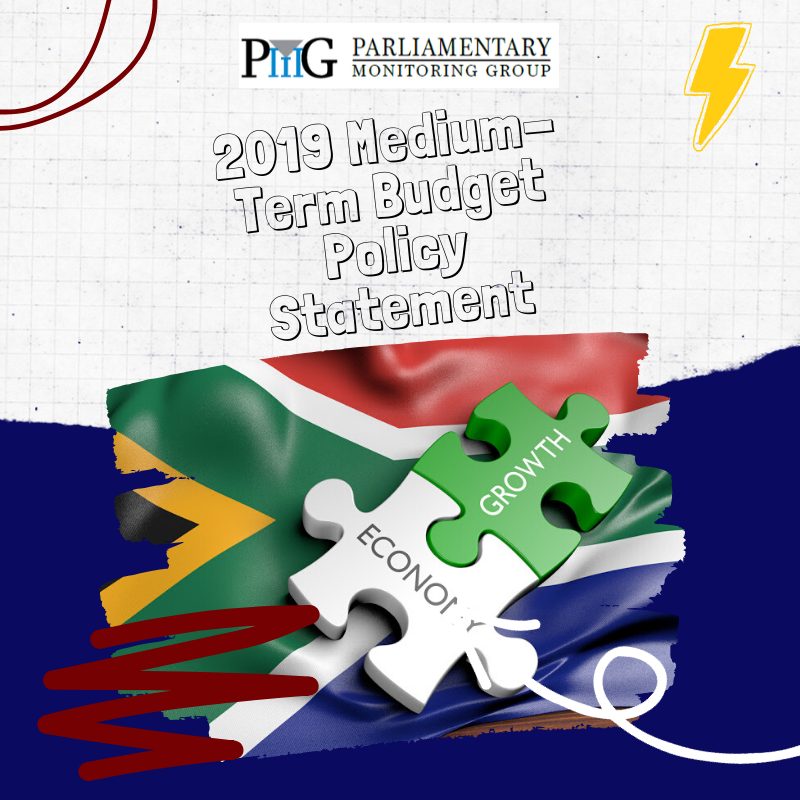Medium-Term Budget Policy Statement (MTBPS) Explainer

The 2019 Medium-Term Budget Policy Statement (MTBPS) is set to be delivered by the Minister of Finance, Mr Tito Mboweni, on Wednesday (30 October 2019). Expectations are high and there’s a motley of issues to look out for. This week’s blog provides an overview of what the MTBPS is all about and highlights the timelines for its processing by Parliament.
What is the MTBPS?
The MTBPS, colloquially termed the mini-budget, is presented to Parliament in October/November each year. Usually, the MTBPS document begins with a summary of the medium-term economic outlook. It then outlines fiscal policy proposals, which are followed by sectorial allocations. It sets out government’s priorities over the next three years and proposes allocations to different departments, as well as the provincial and local governments. It also provides an update on government finances and economic growth, and makes emergency changes to spending. The MTBPS also includes information on:
• Spending estimates for the first half of the current year;
• Any adjustments to the proposed revenue and spending estimates for the second half of the current year; and
• Outcomes for the previous year. For example, the 2019 MTBPS to be presented on 30 October will include outcomes for 2018/19 as well as half-year (April to September) spending estimates for 2019/20 for all the national votes and for education, health, social development and other functions for each province.
In February 2019, Minister Mboweni announced government’s national budget, which included all tax changes and spending plans for the year. The MTBPS is an update to that budget, detailing how spending and tax income may have changed given new developments in the economy. Unlike the February budget, the mini-budget is not expected to propose major changes to government spending or taxes. Within the national budget cycle, the mini-budget is important as it gives an update on tax collection, government spending and deficits, economic growth targets and more, to signal whether the country is still on track to meet plans laid out in the main February budget. It also gives government a chance to reprioritise spending to areas that may urgently need more money. For example, given the challenges within various state-owned entities such as Eskom, South African Airways and Denel, expenditure might have to be reprioritised towards their resuscitation and other priorities. Most importantly, one would argue that the presentation and processing of the mini-budget helps increase transparency, and aids citizens in understanding how South Africa’s social and economic development goals are being attained.
Economic outlook
Minister Mboweni is expected to present South Africa’s economic outlook as analysed and forecasted by the National Treasury. The economic outlook is a forecasted expectation for how well the economy will perform during the upcoming quarter, year or the long run. This would include projections for inflation, productivity growth, unemployment and balance of trade. The economic outlook is critical and watched closely by investors, ratings agencies, tax payers and citizens at large. During a recent appearance before Parliament, the South African Reserve Bank (SARB) warned that risks to growth forecasts are on the downside because of uncertainty over global economic growth. Economic activity remains weak with insufficient investment and job creation. The fiscal environment has deteriorated leading to rising bond yields and undermining business and consumer confidence. Minister Mboweni is expected to express the same sentiments as the SARB and it is likely that the delivery will be used to flag key constraints on economic recovery, and will institute clear calls to action to release the constraints that keep South Africa bound to a low growth path. The South African Revenue Service (SARS) has also indicated that "it’s going to be hard" to reach the estimated R1.58 trillion revenue the National Treasury forecasted for the year that ends in February 2020 as tax revenue for the first five months of the tax year is running significantly behind target. Additional support of R59 billion for cash-strapped Eskom through the Special Appropriation Bill will also probably push the fiscal deficit much wider than projected in February. All this has implications for allocations and will call for a real juggling act on the part of government.
MTBPS processing
Upon its delivery on 30 October, the mini-budget will be processed in a prescribed manner as outlined in the Money Bills Act. The timelines are as follows:
1 to 9 November
The Standing & Select Committees on Finance and Appropriations will call for submissions on the MTBPS (2019 Division of Revenue Amendment Bill and 2019 Adjustment Appropriation Bill) from the public. This is an opportunity for the public to have their voices heard and give meaningful input to budget processes. The deadline for submissions is 14 November 2019. During the same period, the Standing and Select Committees on Finance will hold public hearings on the 2019 Revised Fiscal Framework & Revenue Proposals (6 November) and hear responses by National Treasury to the public submissions on 8 November. The said committees have also invited written submissions on the MTBPS, and submissions must be received by no later than 5 November 2019.
12 November
The Standing Committee on Finance will give consideration to the Committee Report on 2019 Revised Fiscal Framework & Revenue Proposals, and table it for adoption.
13 November
The two Houses of Parliament, the National Assembly and NCOP, are expected to decide on the 2019 Revised Fiscal Framework Report on this date.
About this blog

"That week in Parliament" is a series of blog posts in which the important Parliamentary events of the week are discussed.
We host the latest posts of this blog, written by People's Assembly. You can find more on PA's blog.
About this blog

"That week in Parliament" is a series of blog posts in which the important Parliamentary events of the week are discussed.
We host the latest posts of this blog, written by People's Assembly. You can find more on PA's blog.
